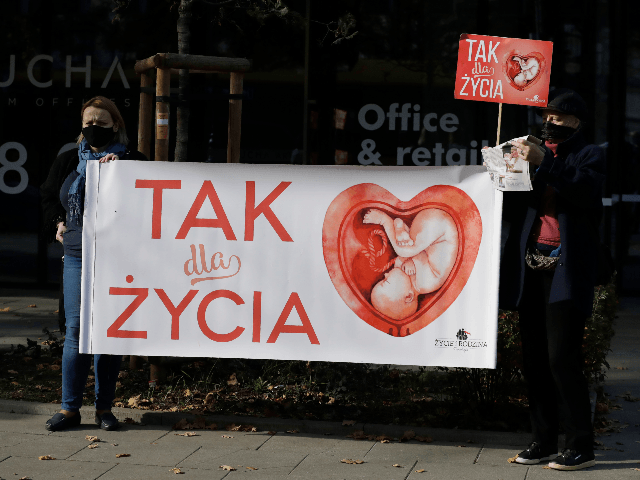A number of European Parliamentarians criticized Poland during a debate Tuesday for its recently enacted ban on eugenic abortions of children with disabilities.
In October 2020, Poland’s Constitutional Tribunal outlawed abortions on the basis of fetal anomalies, insisting that there can be “no protection of the dignity of an individual without the protection of life.”
The court argued that aborting a child because of probable birth defects constituted eugenics, an effort to purify the race by purging society of the weak and undesirable, notoriously practiced by the Nazis against Jews and disabled persons, and advocated by Planned Parenthood founder Margaret Sanger against blacks and minorities in the United States.
Previously, babies with Down syndrome and other anomalies could be legally aborted in Poland, a provision the European Parliament is determined to reinstate.
According to a recent report, the increase in eugenic abortions in Europe have cut the number of births of babies with Down syndrome by more than 50 percent. Data on European births seem to confirm the fears of those who have contended that increased prenatal testing for Down syndrome has led many women to selectively abort their children, the report stated.
On Tuesday, E.U. equality Commissioner Helena Dalli said Poland’s abortion ruling is a sign of the deterioration of sexual and reproductive rights of women in the country, AP reported.
Frances Fitzgerald, of Ireland’s Fine Gael Party, said the abortion ruling was “bleak and inhumane” while Terry Reintke, of Germany’s Green party, said the Polish government is turning the country into “a place where men will have control over women’s bodies.”
Danish MEP Karen Melchior went further still, declaring that women bearing children with lethal fetal defects would now be forced “to give birth to a corpse.”
The European Parliament, which has adopted an ever more radical pro-abortion stance in its international advocacy, had already issued a formal resolution on November 26, 2020 in which it “strongly condemns the Constitutional Tribunal’s ruling and the setback to women’s SRHR in Poland.”
The ruling “puts women’s health and lives at risk,” the resolution stated, by limiting “access to safe and legal abortion in Poland,” adding that “universal access to healthcare and SRHR [which includes abortion] are fundamental human rights.”
The resolution went on to insist “that the performance of an abortion should not be included in the criminal code, as this has a chilling effect on doctors who refrain from providing SRHR services out of fear of criminal sanctions.”
In recent years, the European Parliament has evolved into a global activist for pro-abortion legislation around the planet.
On January 28, 2021, the National Congress of Honduras ratified constitutional reforms prohibiting abortion and acknowledging that the unborn enjoy the same basic rights as those already born, a decision sharply criticized by the European Parliament as well as by the United Nations and the pro-abortion lobby.
“The unborn shall be considered as born for all rights accorded within the limits established by law,” states the amended article 67 of the Constitution. “It is prohibited and illegal for the mother or a third party to practice any form of interruption of life on the unborn, whose life must be respected from conception.”
In a formal declaration, the European Parliament said that Honduras’ constitutional reform prohibiting abortion “is clearly against international norms of human rights.”
“It constitutes a regressive measure that is contrary to the State’s international obligations to avoid measures restricting or undermining progress towards the full realization of human rights,” the communiqué added.
Follow @tdwilliamsrome

COMMENTS
Please let us know if you're having issues with commenting.